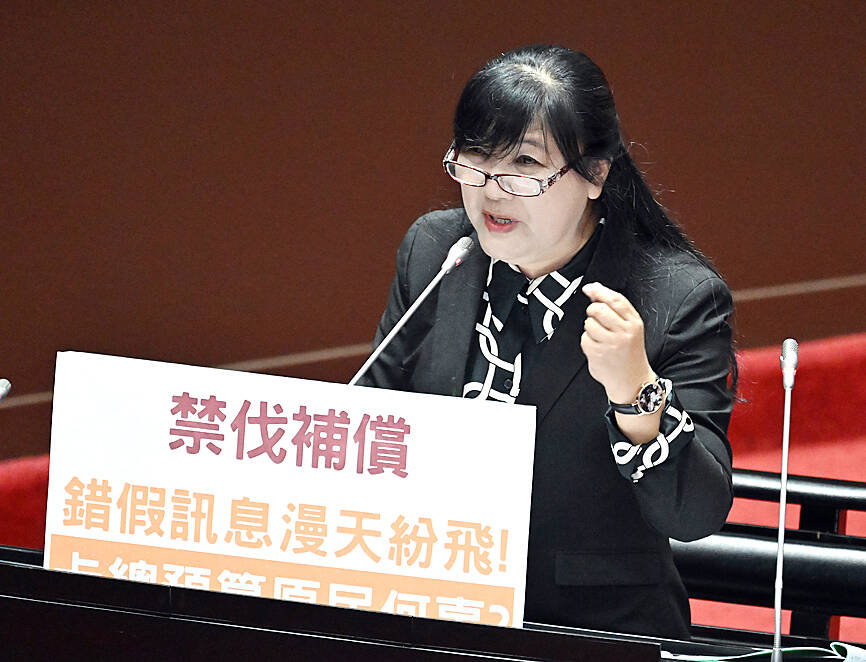A Democratic Progressive Party (DPP) legislator yesterday accused Chinese Nationalist Party (KMT) leaders and their allies of unfairly targeting two indigenous DPP lawmakers, drawing attention to questions regarding the recall of indigenous representatives.
DPP Legislator Saidhai Tahovecahe, representing the highland indigenous constituency, yesterday told reporters that she is being overwhelmed by the KMT party machine, which has called on its local councilors to recall two indigenous DPP lawmakers.
The KMT also joined forces with independent indigenous Legislator May Chin (高金素梅) to set up stations to gather signatures at service offices across the nation, she said.

Photo: Liao Chen-huei, Taipei Times
Tahovecahe, a Rukai from Kaohsiung’s Maolin District (茂林) and Asenay Daliyalrep (Chen Ying, 陳瑩), a Puyuma from Taitung County, are the only two elected indigenous DPP legislators.
The electoral system allows indigenous voters to elect six legislators, three for the “highland” and three for the “lowland” constituencies.
Tahovecahe and her aides said that due to the special nature of combined indigenous constituencies, the DPP has not launched any recall drive against the four other indigenous representatives.
On the other hand, KMT Chairman Eric Chu (朱立倫) and other party officials have named both of the DPP’s indigenous legislators as targets, calling it a “precision recall,” and have given instructions for party members and all indigenous councilors at the local level to pool resources toward that effort, Tahovecahe said.
Central Election Commission data released this week show that among the recalls the KMT submitted, Tahovecahe and Daliyalrep were among the 12 (out of 17) legislators who did not reach the required 1 percent threshold, due to errors and irregularities.
The CEC has given the KMT a 10-day grace period to submit additional signatures needed to reach the 1 percent figure.
Former CEC head Chen In-chin (陳英鈐) said the effort to oust indigenous legislators has been a subject of debate, and would require a constitutional interpretation, as the recall process contravenes the principle of “one person one vote, each ballot must be equal in value.”
When electing indigenous representatives, each person has one vote that they use to vote for one among a choice of representatives, meaning that people with relatively less support can still be elected, Chen said.
However, if there is more than one representative up for a vote in a recall, each voter must cast a ballot for or against each person, meaning they have more than one vote per person, Chen said.
“The CEC must solicit expert viewpoints and undertake studies to adjust the recall threshold in such cases of combined multiple electorates,” he added.
Tahovecahe also accused the KMT of directing the recall effort from the top, whereas recall campaigns against the KMT have been initiated on the local level without aid from DPP members.

Taiwan is stepping up plans to create self-sufficient supply chains for combat drones and increase foreign orders from the US to counter China’s numerical superiority, a defense official said on Saturday. Commenting on condition of anonymity, the official said the nation’s armed forces are in agreement with US Admiral Samuel Paparo’s assessment that Taiwan’s military must be prepared to turn the nation’s waters into a “hellscape” for the Chinese People’s Liberation Army (PLA). Paparo, the commander of the US Indo-Pacific Command, reiterated the concept during a Congressional hearing in Washington on Wednesday. He first coined the term in a security conference last

Prosecutors today declined to say who was questioned regarding alleged forgery on petitions to recall Democratic Progressive Party (DPP) legislators, after Chinese-language media earlier reported that members of the Chinese Nationalist Party (KMT) Youth League were brought in for questioning. The Ministry of Justice Investigation Bureau confirmed that two people had been questioned, but did not disclose any further information about the ongoing investigation. KMT Youth League members Lee Hsiao-liang (李孝亮) and Liu Szu-yin (劉思吟) — who are leading the effort to recall DPP caucus chief executive Rosalia Wu (吳思瑤) and Legislator Wu Pei-yi (吳沛憶) — both posted on Facebook saying: “I

The Ministry of Economic Affairs has fined Taobao NT$1.2 million (US$36,912) for advertisements that exceed its approved business scope, requiring the Chinese e-commerce platform to make corrections in the first half of this year or its license may be revoked. Lawmakers have called for stricter enforcement of Chinese e-commerce platforms and measures to prevent China from laundering its goods through Taiwan in response to US President Donald Trump’s heavy tariffs on China. The Legislative Yuan’s Finance Committee met today to discuss policies to prevent China from dumping goods in Taiwan, inviting government agencies to report. Democratic Progressive Party Legislator Kuo Kuo-wen (郭國文) said

The Ministry of Economic Affairs has fined Taobao NT$1.2 million (US$36,900) for advertisements that exceeded its approved business scope and ordered the Chinese e-commerce platform to make corrections in the first half of this year or its license would be revoked. Lawmakers have called for stricter supervision of Chinese e-commerce platforms and more stringent measures to prevent China from laundering its goods through Taiwan as US President Donald Trump’s administration cracks down on origin laundering. The legislature’s Finance Committee yesterday met to discuss policies to prevent China from dumping goods in Taiwan, inviting government agencies to report on the matter. Democratic Progressive Party